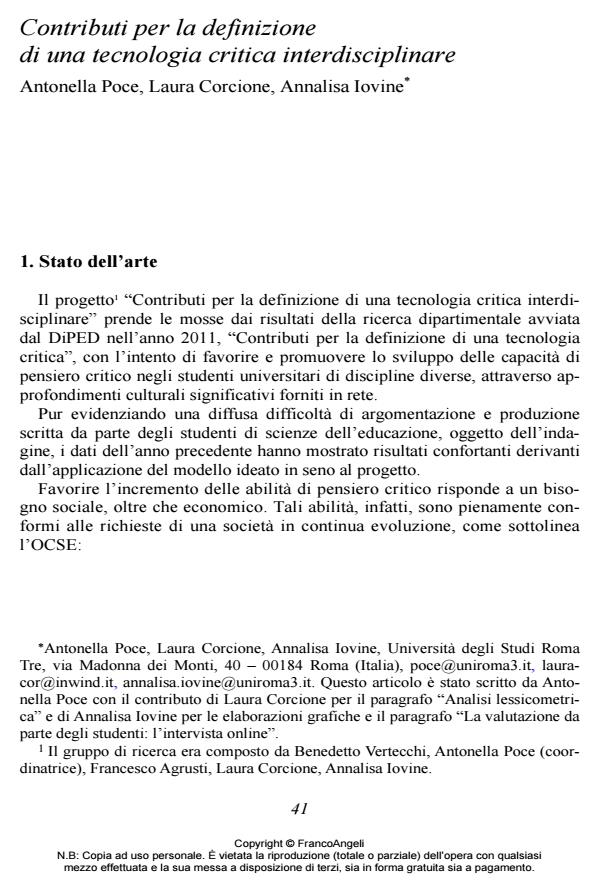Contributi per la definizione di una tecnologia critica interdisciplinare
Titolo Rivista CADMO
Autori/Curatori Antonella Poce, Laura Corcione, Annalisa Iovine
Anno di pubblicazione 2013 Fascicolo 2013/1 Lingua Italiano
Numero pagine 22 P. 41-62 Dimensione file 216 KB
DOI 10.3280/CAD2013-001004
Il DOI è il codice a barre della proprietà intellettuale: per saperne di più
clicca qui
Qui sotto puoi vedere in anteprima la prima pagina di questo articolo.
Se questo articolo ti interessa, lo puoi acquistare (e scaricare in formato pdf) seguendo le facili indicazioni per acquistare il download credit. Acquista Download Credits per scaricare questo Articolo in formato PDF

FrancoAngeli è membro della Publishers International Linking Association, Inc (PILA)associazione indipendente e non profit per facilitare (attraverso i servizi tecnologici implementati da CrossRef.org) l’accesso degli studiosi ai contenuti digitali nelle pubblicazioni professionali e scientifiche
The Project "Contributions to the definition of an interdisciplinary critical technology" stems from the results of a departmental research started by DIPED (Department for Educational Design) in 2011, "Contributions to the definition of a critical technology", with the aim of favouring and promoting the development of critical thinking skills in higher education students, from different areas of study, offering online cultural insights. The results obtained in the previous research, though highlighting a certain difficulty in argumentation and writing production, were comforting as regards the employment of the model (Poce et al., 2012) devised by the research group for the project. The hypothesis to be verified aimed at establishing if proposing cultural insights to students, built according to specific structures on which guided discussions are carried out online, critical thinking skills are improved, notwithstanding the field of study. Assuming that present higher education students show a widespread difficulty in writing and argumentation, the research group decided to extend the model devised in 2011 also to other areas of study to assess its efficiency. This has ben possible thanks to the creation of an ad hoc teaching and learning module entitled "Critical thinking skills and the reading of the classics", available on the Orbis Dictus (Vertecchi et al., 2010) e-platform (www.orbisdictus.it), where two groups of students could access: one from the faculty of Education, University Roma Tre and one from the faculty of Engineering - University of Salento. The activity allowed some general considerations. Notwithstanding the small numbers of the students involved (48 students in total in the year 2012), the opportunity to carry out the analysis with two different cohorts of students (2011 and 2012) from the Faculty of Education - Università Roma Tre allowed a diachronic evaluation of results. For the first time, then, the research group could employ the model also with another field of study students. Taking into consideration the differences between the groups involved, data collected show a positive impact of a model that wants to make a critical use of technology and, employing consolidated teaching and learning structures, put democratically at disposal of everyone cultural insights, which are essential to educate "a free citizen in a free republic" (Garin, 1957, p.157).;
Keywords:Critical thinking skills, online learning, content analysis, innovation, critical technology.
- Poce, A., Corcione, L., Iovine, A. (2012), “Content Analysis and Critical Thinking. An Assessment Study”, Cadmo XX, 1, pp. 47-63.
- Poce, A. (a cura di) (2012), Contributi per la definizione di una tecnologia critica. Un’esperienza di valutazione, Milano: FrancoAngeli.
- Bloom H. (1994), The Western Canon. The Books and School of the Ages, New York: Berkeley Publishing Group.
- Garin E. (1957), L’Educazione in Europa, Bari: Laterza, p. 157.
- Krippendorf, K. (2004), Content Analysis: An Introduction to Its Methodology, Beverly Hills: Sage Publications.
- Laurillard, D. (2008), Digital Technologies and their Role in Achieving our Ambitions for Education, London: IOE.
- Losito G. (1993), L’analisi del contenuto nella ricerca sociale, Franco Angeli, Milano.
- Marra R.M. et al. (2004), “Content Analysis of Online discussions Forums: A Comparative Analysis of Protocols, Educational Technology Research and Development, 52, 2.
- Newman D.R., Webb, B., Cochrane C. (1997), “Evaluating the Quality of Learning in Computer supported co-operative learning”, Journal of the American Society for Information science, 48, 6.
- OECD (2010), Investing in Human and Social Capital: New Challenges, theme 1, “Tackling the Effects of the Crisis on Education”, Paris, http://www.oecd. org/site/0,3407,en_2157 1361_44559030_1_1_1_1_1,00.html, 09.05.2013.
- OECD (2010), Investing in Human and Social Capital: New Challenges, theme 2, “Matching skills with new needs”, Paris, disponibile http://www.oecd.org/site/0,3407,en_21571361_ 44559030_1_1_1_1_1,00.html, l.a. 09.05.2013.
- Paul, R., Elder, L. (2002), Critical Thinking: Tools for taking Charge of you Professional and Personal Life, Upper Saddle River (NJ): Pearson Education.
- Poce, A. (2006), “Valutare gli apprendimenti mediatizzati”, in I percorsi e i processi della didattica multimediale. Strumenti e metodologie per processi educativi innovativi, a cura di F. Faiella, Lecce: Pensa editore.
- Poce, A., Corcione, L., Iovine, A., Agrusti, F. (2011), Il Podcasting nello strumentario dell’istruzione in rete. Verifica sperimentale delle nuove ipotesi, Milano: FrancoAngeli.
- Rositi, F. (1988), “L’analisi del contenuto”, in La ricerca sull’industria culturale, a cura di F. Rositi e M. Livolsi, Roma: La Nuova Italia Scientifica.
- Vertecchi, B. (2011), “OCSE, Più attenzione ai contesti”, Tuttoscuola, 48. Vertecchi, B., Poce, A., Angelini, C., Agrusti, F. (2011), Orbis Dictus. Un ambiente adattivo multilingue per l’istruzione in rete, Milano: FrancoAngeli.
- A systematic review on critical thinking intervention studies in higher education across professional fields Blanca Puig, Paloma Blanco-Anaya, Inés M. Bargiela, Beatriz Crujeiras-Pérez, in Studies in Higher Education /2019 pp.860
DOI: 10.1080/03075079.2019.1586333 - Project and Design Literacy as Cornerstones of Smart Education Poce Antonella, De Medio Carlo, Amenduni Francesca, pp.143 (ISBN:978-981-13-9651-9)
Antonella Poce, Laura Corcione, Annalisa Iovine, Contributi per la definizione di una tecnologia critica interdisciplinare in "CADMO" 1/2013, pp 41-62, DOI: 10.3280/CAD2013-001004